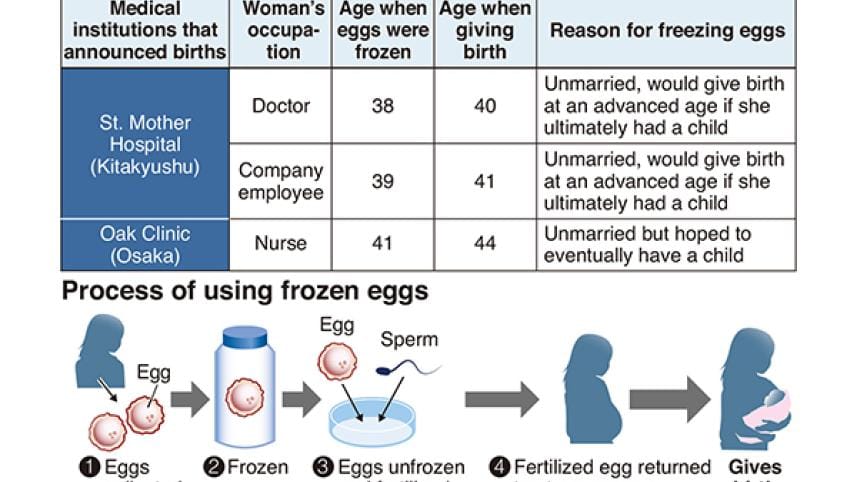FEATURE: More Japanese women freeze eggs for future babies

At least 23 medical institutions around the country preserve the frozen eggs of healthy women to help them have babies in the future, and three women in their 40s have used their frozen eggs to have babies, The Yomiuri Shimbun has learned.
A total of 562 women had frozen eggs preserved at these institutes as of the end of February this year.
The possibility of childbirth increases if eggs are collected and cryopreserved when women are as young as possible. However, some people are concerned that the current situation will encourage delivery at an advanced age, which can have high health risks both for the mother and the baby.
In October last year, The Yomiuri Shimbun sent questionnaires to 597 medical institutions registered with the Japan Society of Obstetrics and Gynecology as facilities that provide advanced infertility treatment. Of this number, 304 facilities had responded as of Saturday and 23 facilities disclosed the number of healthy women who had frozen their eggs.
The age when the women had their eggs collected ranged from 24 to 49. Thirty-one women unfroze their eggs and used them. Of the 31, three women gave birth — two at St. Mother Hospital in Kitakyushu and one at Oak Clinic, Sumiyoshi in Osaka.
All the women were single, and froze their eggs when they were 38, 39 and 41. After they got married, they underwent in vitro fertilisation using frozen eggs and they gave birth at the ages of 40, 41 and 44, according to the medical institutions.
Asked why healthy women wanted to freeze their eggs, with multiple answers allowed, 21 facilities quoted women as saying “I have no partner now,” while seven quoted women as saying “I can’t give birth now because I’m busy with work or for other reasons.”
Freezing eggs started in about 2000 for women whose ovarian functions would be damaged through cancer treatment or for other reasons, to make it possible for them to give birth in the future. Egg freezing for this kind of purpose is conducted at 118 facilities, according to the survey.
Some facilities later started freezing eggs for healthy women as a measure against age-related fertility problems. Egg freezing apparently increased immediately after the Japan Society for Reproductive Medicine devised a guideline in 2013 that permits egg freezing for healthy women under certain conditions.
Of the 23 facilities, 14 facilities started services to preserve frozen eggs from that year. The number of institutes to provide the service may increase in the future.
According to the society’s guideline, it is not recommended to collect eggs from women aged 40 or over, or to use frozen eggs for women aged 45 or over, due to the risks of late childbearing. However, the survey results show that about 40 percent of women had their eggs collected at the age of 40 or over.
Among the 370,000 cases of in vitro fertilisation conducted annually, eggs are usually fertilized without being frozen and fertilised eggs that grow well are transplanted into wombs.
At the egg stage, it is not known whether an egg will become a fertilised egg that can be transplanted, so freezing eggs does not increase the probability of giving birth over in vitro fertilisation conducted with non-frozen eggs.
Yutaka Osuga, a professor at the University of Tokyo Hospital who specialises in gynecologic surgery, is calling people’s attention to the fact that there will be high risks for mother and child when a women gets pregnant through frozen eggs at an advanced age.
“Regardless of egg quality, hypertension due to pregnancy and premature delivery will increase with aging,” Osuga said.
Copyright: The Japan News/ Asian News Network



 For all latest news, follow The Daily Star's Google News channel.
For all latest news, follow The Daily Star's Google News channel.
Comments